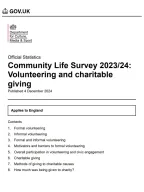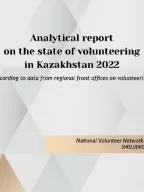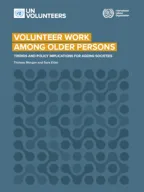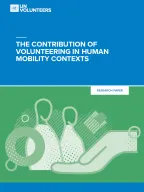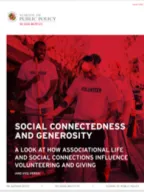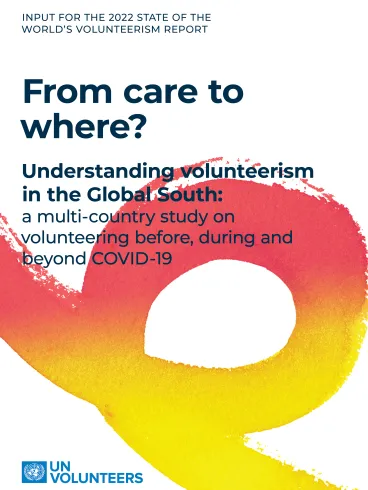
Technical paper
From care to where? Understanding volunteerism in the Global South: a multi-country study on volunteering before, during, and beyond COVID-19
State of the World’s Volunteerism
Download
Fast read
- Volunteerism is an essential fabric of all societies and a critical resource for peace and development. While much is known about volunteerism in the Global North, there has been far less research on the shape of volunteering in the Global South.
- As efforts are taken to better understand the impact of the COVID-19 pandemic on individuals and institutions, there is a risk of evidence gaps growing ever wider, even as the world’s one billion volunteers constitute or contribute to the safety nets and social protection systems available to some of the most vulnerable populations.
- To start bridging these evidence gaps, this study presents patterns of volunteer action and experiences in eight Global South countries during the COVID-19 pandemic, along with voluntary participation plans in the year to come.
Summary
- The study draws on interviews with over 8,000 people in eight countries: Bolivia, India, Kenya, Lebanon, Senegal, Thailand, Turkey and Uzbekistan. The following questions were addressed: 1) What did volunteering look like in 2020 and early 2021? 2) Did volunteering participation change compared with previous years? 3) What is understood about people’s plans to volunteer in the future?
- Nationally representative telephone surveys were conducted in all eight countries between March and April 2021.
- The findings show that at least three quarters of all adults volunteered in 2020/2021 as countries and communities grappled with COVID-19. The majority of each demographic group—by gender, age and employment status—reported having volunteered during a time of great need due to the pandemic, and as having even greater solidarity.
- Changes in people’s voluntary participation were complex and often without a clear overall pattern when looking at individuals and groups. Volunteering is evidently affected by the interplay of macro factors, such as the scale of the pandemic and national responses (e.g. lockdowns), with micro factors, including illness. When net participation was taken into account, some countries saw overall declines in voluntary action, while others saw moderate increases. Most worryingly, civic participation declined across seven of the eight survey countries.
- In terms of future volunteering, as people struggle with health, livelihoods and well-being, many people had plans to volunteer over the next 12 months, with the survey countries exhibiting varied participation levels. People’s plans also revealed greater appetite to diversify their volunteering roles beyond mutual aid and service delivery. There was high demand to participate in civic affairs and to work with others on innovative solutions to local problems, two or three times more than seen previously, even when taking the pandemic into account.













